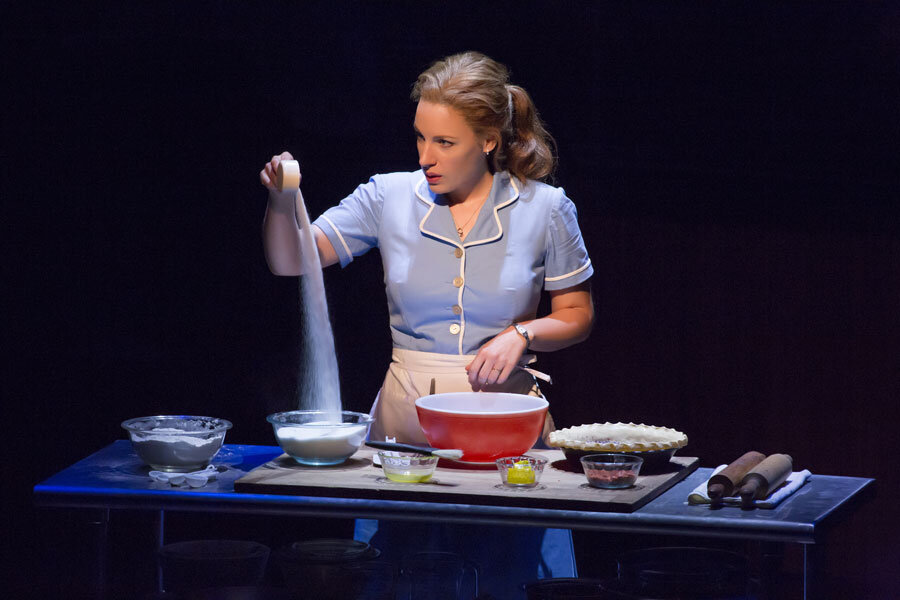Waitress
The confection being served up at the Brooks Atkinson Theatre is neither sweet nor savory. In fact, it can’t be summed up in a single word, despite present-day culture’s obsession with concise descriptions and hashtags. (#SorryNotSorry.) Instead, it’s a delightfully complex and complicated product with moments that sometimes edge near a familiar flavor we’ve all had before but for the most part is both melancholy and motivating. If one must resort to a single word to describe the new musical Waitress, it would be bittersweet.
Adapted from Adrienne Shelly’s 2007 movie of the same name, directed by Diane Paulus and with a score by first-time Broadway composer Sara Bareilles and a book by Jessie Nelson, Waitress offers a look into the life of Jenna, a small-town woman who escapes from her abusive marriage by working at a local diner as a server and pie chef. Her best friends and coworkers Becky (Keala Settle) and Dawn (Kimiko Glen) know of Jenna’s less-than-happy home life and encourage her to leave her husband, especially after Jenna learns she is unexpectedly pregnant (which she blames on a night of too much alcohol and a certain red dress).
The audience watches as Jenna embarks on an unexpected affair with her gynecologist, Dr. Pomatter (an endearingly and awkwardly charming Drew Gehling), while secretly planning to enter a pie contest that offers a prize of $20,000, which would fund her getaway from her husband, Earl (played with equal parts enthusiasm and menace by Nick Cordero), who pockets all of her money at the end of every workday.Much of the excitement surrounding Waitress — and there has been quite a bit — has focused on the cast and history-making all-female creative team.
Mueller, who won a Tony in 2014 for bringing unexpected depth and emotion into the enjoyable but unimpressive jukebox work Beautiful: The Carole King Musical, does not disappoint in her return to Broadway. As Jenna, she communicates endless pain and suffering at the hands of her husband using few words — except for when she apologizes for getting pregnant after telling him only to avoid another beating — and endless expressions, and her singing has only improved, if that was even possible. One aspect of Waitress that is both effective and frustrating is what is left unsaid in the book — the words “abuse,” “hit” and “abortion” are just a few — and in the hands of a less skillful actress than Mueller, the more painful parts of Jenna’s story might go unnoticed.
And then there’s the music, by Bareilles, a well-known and Grammy-nominated singer-songwriter whose music has embraced stories of heartbreak as well as the frustrations of feminism and simply being a woman in today’s world. (A personal favorite of mine is “King of Anything.”) Waitress marks the first time Bareilles has written for the stage, but one wouldn’t guess it by the score. She has produced an album of character-driven songs that actually advance the plot, rather than simply repeating what the actors have already said. A first-act standout is “When He Sees Me,” a poignant melody of fear and self-consciousness in which Dawn lists numerous reasons why she shouldn’t go on a date with someone before admitting her fear of emotional vulnerability. But the song that will no doubt be the most well-remembered is “She Used To Be Mine,” an anthem of self-realization sung by Jenna in the second act, and Mueller hits it out of the park. After almost two hours of watching Jenna refuse to put her feelings into words, she lets loose with an eruption of emotion.
Mueller is joined onstage in solidly entertaining and moving performances by Settle and Glenn, as well as Eric Anderson who plays the diner’s gruff manager. While Cordero does what he can with the character of Earl, attempting to infuse it with comedic moments of narcissism as well as the threat that he poses in Jenna’s life, one wishes the character had been written more fully, as well as the nosy nurse in Dr. Pomatter’s office, who does earn laughs simply by walking offstage but falls too far into the stereotype of the sassy black woman. The criminally talented Chris Fitzgerald is an especial standout as Ogie, giving a determinedly hilarious performance as a persistent suitor of Dawn’s (but I confess to having qualms about lyrics like, “If it seems like I did [leave], I’m probably waiting outside” as he assures Dawn of his devotion). Mueller and Gehling spark satisfying chemistry as lovers, as well as sharing a surprisingly moving duet.
The violence of the show, both physical and emotional is staged effectively, with Lorin Latarr’s fluid choreography, and Scott Pask’s sets move from the oppression of Jenna and Earl’s house to the open air of what might exist outside of her small world.Until recently a story like Waitress —written by women and about a woman and without a stereotypical happily ever after — would only have existed outside of Broadway, but it is a welcome change, for sure.

